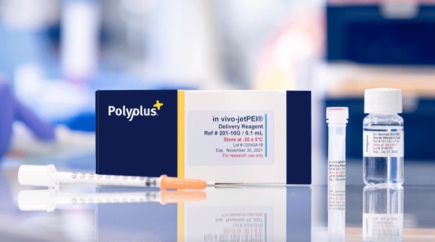in vivo-jetPEI® is a ready-to-use cationic polymer reagent recommended for in vivo transfection of DNA, siRNA, miRNA, shRNA and other oligonucleotide...

Meet our Team at booth #211 during CRS 2023 Annual Meeting 2023, in Las Vegas, NV, USA, July 24-28, 2023. Don't miss the opportunity to hear our talk on how cationic lipids offer new possibilities in liposome and LNP engineering for RNA therapeutics and poster presentations on our off-the-shelf DNA and mRNA in vivo delivery solutions.
 |
Claire GUEGUEN Ph.D., R&D Life Sciences Manager at Polyplus®. |
 |
Malik HELLAL Ph.D., Director Chemistry R&D at Polyplus®. |
Summary of presentation : Ionizable lipid nanoparticles (LNPs) have been widely used for in vivo delivery of RNA therapeutics with the particular that they predominantly end up targeting the liver (Patisiran, BNTech162b, mRNA-1273). The current challenge is the use of commercially available lipids to have a better control over the biodistribution of the RNA once delivered systemically to target different organs and cell types.
Ionizable lipid nanoparticles (LNPs) have been widely used for in vivo delivery of RNA therapeutics with the particularity that they predominantly end up targeting the liver. The current challenge is the use of commercially available lipids to achieve specific formulations that can ensure wider biodistribution of the RNA once delivered to target different organs and cell types. Liposomes and LNPs were characterized by DLS to assess size and zeta potential and mRNA encapsulation efficiency was assessed using the RiboGreen assay. Here we demonstrate how our ready to use in vivo-jetRNA®+ transfection reagent can efficiently deliver mRNA to different cell lines and organs. Firstly, we evaluated in vivo biodistribution using both systemic and local administration routes (respectively intravenous and intramuscular). Secondly, we performed an in vivo toxicity study in mouse post-delivery of mRNA- in vivo-jetRNA®+ liposomes. In addition to biodistribution, efficacy and toxicity, we assessed the stability of mRNA encapsulated within in vivo-jetRNA®+ liposomes by comparing efficacy of complexes following their storage at 4°C for at least 1 month to freshly prepared complexes.
Nucleic acids have considerable potential as therapeutic agents in the treatment of pathologies including genetic diseases, viral infections, and cancer therapies. The major challenge for the use of nucleic acids in therapy lies in safe delivery of these anionic macromolecules to their intended sites of action. Our cationic polymer-based reagent, in vivo-jetPEI®, was tested for plasmid DNA and siRNA in vivo delivery through intravenous and intraperitoneal injections in mice to evaluate its efficacy, safety and biodistribution. Here we demonstrate that in vivo-jetPEI® can efficiently and safely deliver various nucleic acids in vivo to target a wide range of tissues, through various routes of administrations. Furthermore, in vivo-jetPEI® is widely acknowledged to deliver nucleic acids in animals; and coherently is selected as the delivery vector of choice in several drug development programs, notably for cancer therapies. To fulfill all the quality requirements associated to its use in Human, Polyplus® supplies a cGMP grade in vivo-jetPEI® reagent for a growing number of clinical trials.